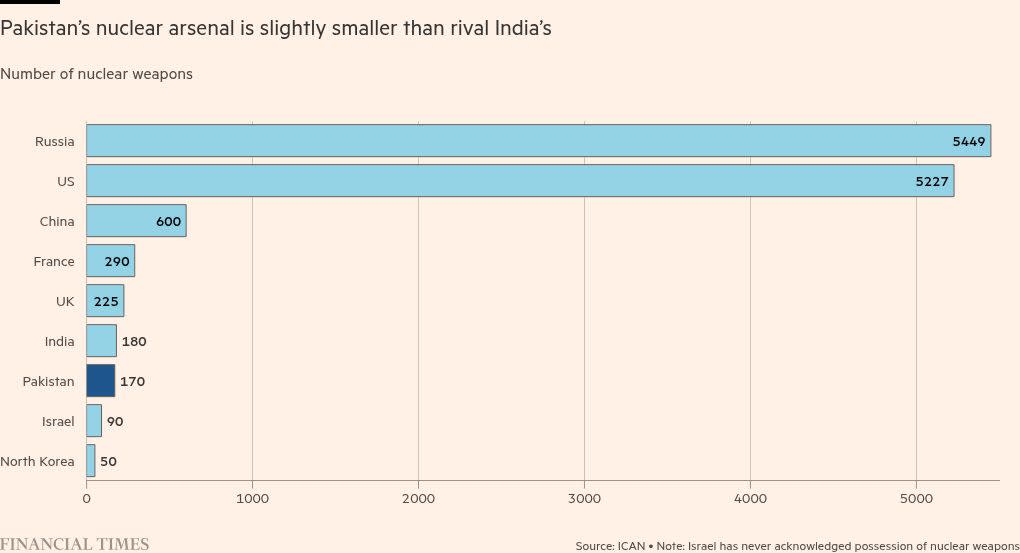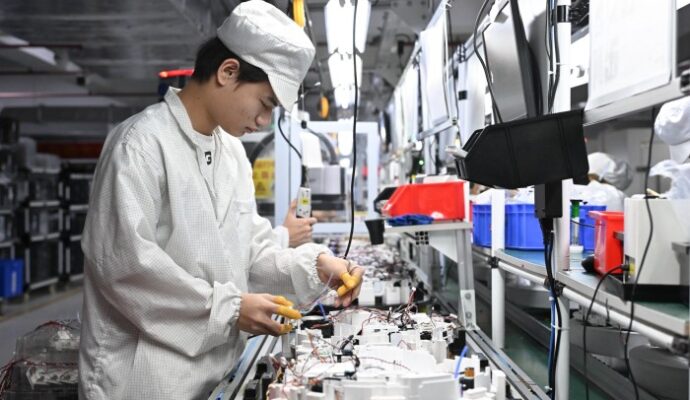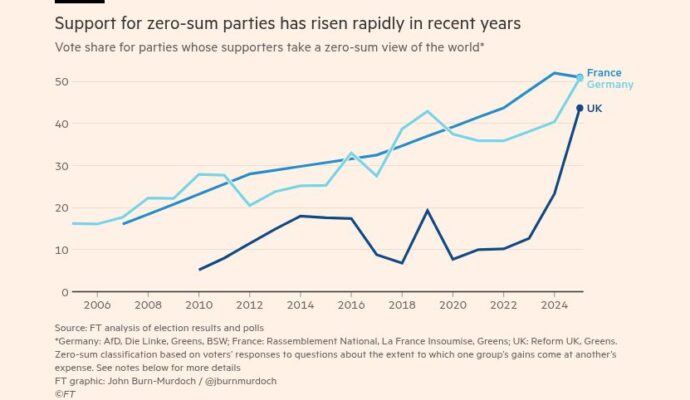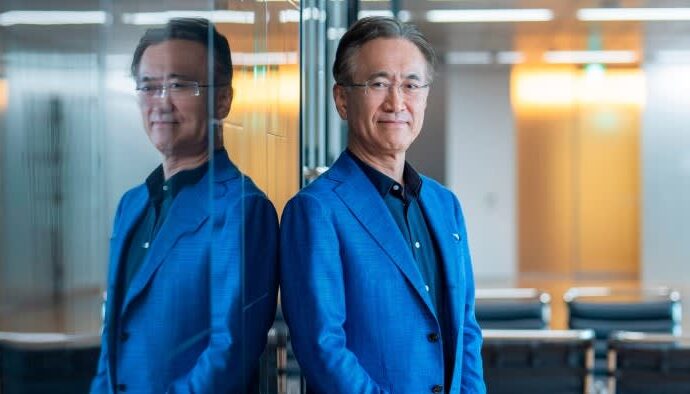In May 1998, weeks after India had tested a nuclear weapon not far from Pakistan’s border, the Pakistani premier Nawaz Sharif made a phone call to then Crown Prince Abdullah bin Abdulaziz in Riyadh.
Would Saudi Arabia stand by its Muslim brother if Sharif launched a counter-test — a flex of Pakistan’s military prowess that would undoubtedly draw massive western sanctions?
The answer became obvious within days of Pakistan’s own subsequent atomic test. Some 50,000 barrels of Saudi oil a day, free of charge, helped it to weather the ensuing sanctions.
This week, Pakistan’s Prime Minister Shehbaz Sharif — Nawaz’s younger brother — flew to Riyadh, but this time he and his powerful army chief, Asim Munir, were the ones bearing succour. Saudi Arabia, deeply dependent on US weapons and technology, would enter a defence pact with nuclear-armed Pakistan, just months after Islamabad had clashed with New Delhi.
Their joint declaration came as the Middle East was being reshaped by an unrestrained Israel, a wounded Iran and an unpredictable US. As Israel struck Palestinian militants in Qatar, a key US ally, on September 9, President Donald Trump stood by. The attack in the heart of Doha shocked Gulf leaders.
While the details of the pact remain vague, and Saudi officials maintained the timing was incidental, the implications were clear: if Israel and the US were reshuffling the Middle East order, Saudi Arabia was keen to shore up an older alliance with a nimble friend.
“We shouldn’t read it as responsive to this precise moment, but it is a response to the broader tectonic shifts in the region,” said Joshua White, a fellow at the Washington-based think-tank Brookings who has worked in both India and Pakistan.
“Both countries have significant incentives to be diversifying right now, because of the behaviour of the United States — it’s a moment where they both need to create options for themselves.”
This specific mutual defence pact was a few years in the making, Saudi officials told the Financial Times. But the two countries’ military interests have been intertwined for decades.
As far back as 1974 — close to the time of India’s first nuclear test and Israel’s victory in the 1973 war against its Arab neighbours — then-prime minister Zulfikar Ali Bhutto had approached Saudi Arabia’s King Faisal seeking backing for Pakistan’s quest for its own bomb.
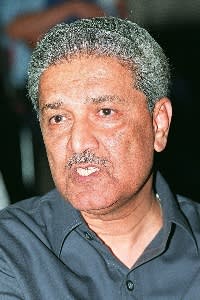
The pursuit took decades of thievery, dogged nationalism and diplomatic guile.
Abdul Qadeer Khan, the father of Pakistan’s nuclear bomb, was responsible for smuggling advanced centrifuge technology in the 1980s and 1990s from the west to Pakistan, and then to Iran, Libya and others, according to his own confession and multiple investigations.
But the long road to the nuclear club was also paved with Saudi petrodollars, said military historians.
Since the 1960s, Pakistan has received more aid from Saudi Arabia than from any nation outside the Arab world, the Brookings Institution estimated. The funding — which was never directly for support of Islamabad’s covert nuclear programme — included direct aid to the government as well as financing for schools, mosques and other Islamist charitable programmes.
As Pakistan languished under western sanctions in the 1990s, “Saudi Arabia provided generous financial support to Pakistan that enabled the nuclear programme to continue”, retired Pakistani Brigadier General Feroz Khan wrote in Eating Grass: The Making of the Pakistani Bomb.
Following Pakistan’s 1998 nuclear test, much of the Muslim world hailed the arrival of the “Islamic bomb”. In a public show of gratitude for Saudi aid, Pakistan had already renamed a city after King Faisal. In private, the support created an expectation that the Sunni- majority allies would share deeper military ties.
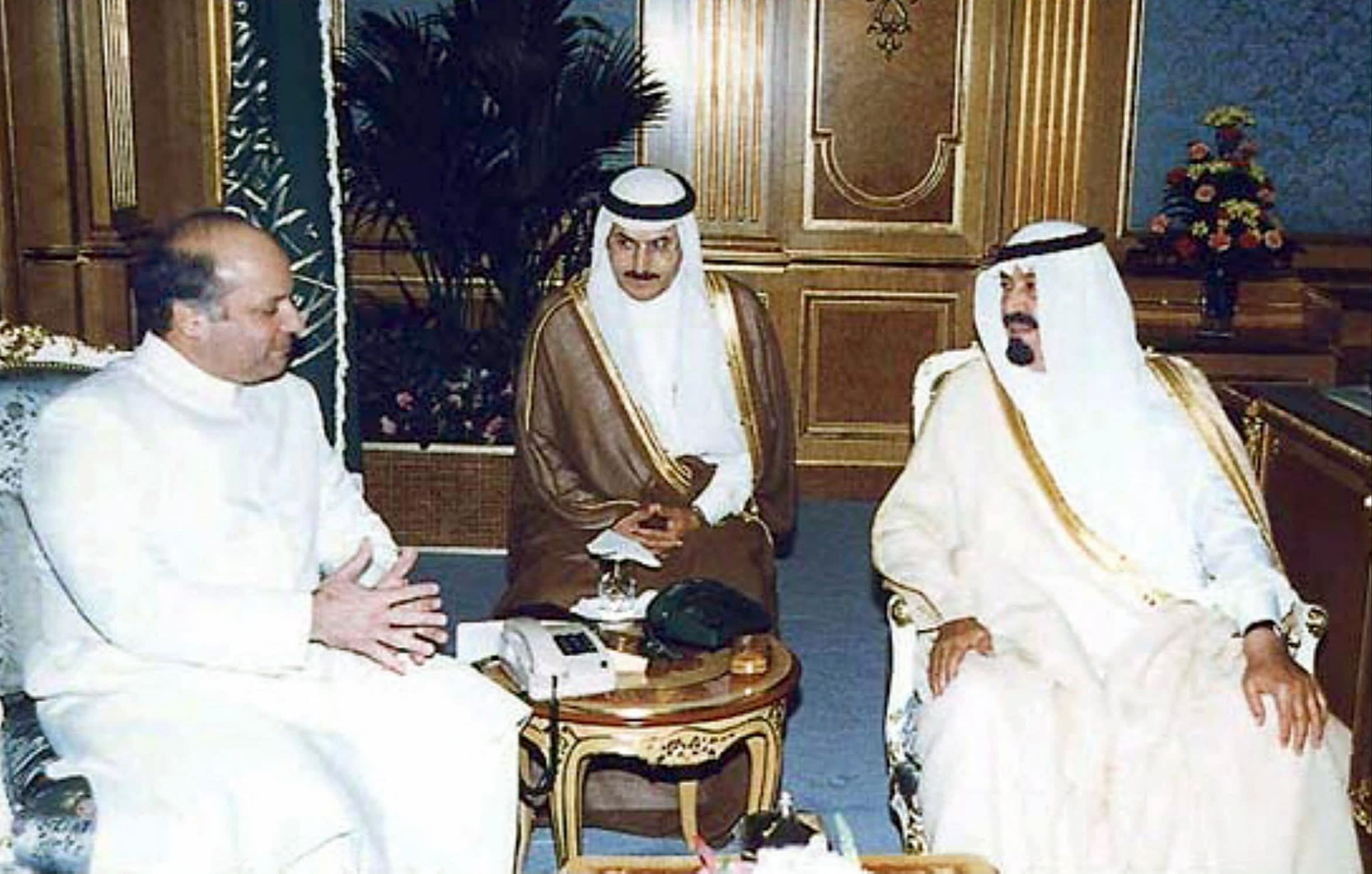
Pakistani troops guarded Saudi Arabia’s northern border during the Iran-Iraq war in the 1980s, and its Inter-Services Intelligence became the conduit for Saudi and American cash that helped the Afghan mujahideen drive out the Russians.
Today, experienced Pakistani military advisers help train the comparatively untested Saudi military, and a former Pakistani army chief commands a Saudi-led counterterrorism force based in Riyadh.
Ever since Saudi Arabia’s then-defence minister toured Pakistan’s uranium enrichment plant in 1999, the Gulf kingdom has asked Pakistan “to share technical and scientific knowledge” for a nuclear programme, said Khan, a request Islamabad has mostly resisted.
“There has never been a written quid pro quo” that Saudi economic support was intended to permit it to later rent a nuclear bomb, added Khan, now a professor at the Naval Postgraduate School in California.
But, he said: “If there is a nuclear Iran and a completely unrestrained Israel, Pakistan is useful as Saudi gets ready for the long haul.”
The entire time Pakistan was building its bomb, Israel was watching, said Uzi Arad, former research director at Israel’s spy agency Mossad. By the early 1980s Israel had put into play its policy of sabotaging, and then bombing, any belligerent Arab state seeking nuclear weapons. But Pakistan presented a complex challenge.
“Pakistan wasn’t Arab, but it was Islamic — it wasn’t part of the Middle East, but the Americans treated it as such,” he said. More importantly, in the 1980s, it was a crucial US partner in Afghanistan, and its nuclear ambitions were deemed an American problem.
Israel instead turned its attention to the Iraqi reactor, bombing it in 1981, and then to Iran.
“Pakistan, we set aside for the future,” he said, adding that Israel did devote resources to tracking Islamabad’s sharing of nuclear secrets with Iran, Libya and others.
At the same time, Pakistan’s relationship with its Gulf patrons has not always been a smooth one. Relations were strained in 2015 when Islamabad bowed to public pressure and declined to join Saudi-led air strikes over Yemen.
As evidence of Pakistan’s elaborate constellation of diplomatic ties, a top Emirati diplomat publicly complained at the time that despite “inevitable” economic and financial support from Riyadh and Abu Dhabi, “Tehran seems to be more important to Islamabad . . . than the Gulf countries”.
Yet Pakistan continues to depend on regular oil facilities, bailouts and rollovers from Saudi Arabia, China and the United Arab Emirates to stay afloat.
Observers said the new deal had been presented in intentionally vague terms. White said: “You can’t have deterrence without some constructive ambiguity . . . This agreement telegraphs to others that [the Saudis] have options and introduces questions in the minds of their adversaries.”
Ali Shihabi, a commentator close to the royal court whose father served as ambassador to Pakistan in the 1980s, was more conclusive: the deal, he said, “puts you under [Pakistan’s] nuclear umbrella in case of an attack”.
Pakistan’s defence minister Khawaja Mohammad Asif, who has limited power due to the military’s influence over policymaking, told a local TV channel on Thursday: “What we have, and the capabilities we possess, will be made available to [Saudi Arabia] according to this agreement.” On Friday, however, he told Reuters the nuclear umbrella was “not on the radar”.
Rabia Akhtar, director of the Center for Security, Strategy and Policy Research at the University of Lahore, said the agreement “shores up conventional security guarantees, access to Pakistani training and defence expertise, and the symbolism of a Muslim-majority nuclear power standing beside it”.
But for Pakistan, which is more focused on India than the Middle East, the deal does entail risks, including to its relatively warm relations with the Trump administration.
“The Americans and Israelis have always been paranoid that Pakistan’s nuclear and missile programmes might pose a threat to Israel, and this deal risks fuelling those fears,” said one former official who has knowledge of mediated dialogues between Pakistani and Israeli officials on Pakistan’s nuclear doctrine.
Riyadh’s long-awaited defence pact with the US has been derailed by Israel’s war in Gaza, delaying any possible normalisation between the Jewish state and Saudi Arabia — a crucial element of the US-Saudi pact.
But the deal will still draw Israel’s ire and US scrutiny, said Khan.
“Pakistan will need to be very, very careful not to rattle its geopolitical sweet spot with China, Iran, Saudi Arabia and the US,” he said. “If this draws India and Israel closer, brings further sanctions to [Pakistan’s] ballistic missile programme, and fuels India’s efforts to isolate Islamabad, it might end up as a strategic blunder.”
India will study the implications of this development for its national security, its foreign ministry said.
The country has built closer defence and diplomatic ties with Israel under Prime Minister Narendra Modi’s premiership, but “New Delhi wouldn’t be in a rush to formalise its defence relationship with Israel”, said Praveen Donthi, senior analyst for India with the Crisis Group. “New Delhi will take up the challenge and sharpen its multi-alignment approach to international relations.”
At the same time, Saudi Arabia is betting that its own close ties to India will endure, said Shihabi.
“India will understand. They understand that the kingdom has security needs and are aware of the history between Saudi Arabia and Pakistan,” he said. “It is signalling to the US. It shows Saudi Arabia has options and the US is not the only game in town. It’s also sending a message to Israel.”
But the public and ambiguous nature of this defence pact also signalled to Israel and the US that it did not carry the same proliferation risks as Pakistan’s nuclear “black market” in the past, said one Israeli official, leaving both countries room to react — or not — in the future.
“The Pakistanis are not giving their bomb to Saudi Arabia,” the person said, citing discussions within the Israeli government. “But the Saudis are also saying something very loudly: ‘We have other friends in the world’.”
Additional reporting by Andres Schipani in New Delhi, Ahmed Al-Omran in Riyadh and Andrew England in London
